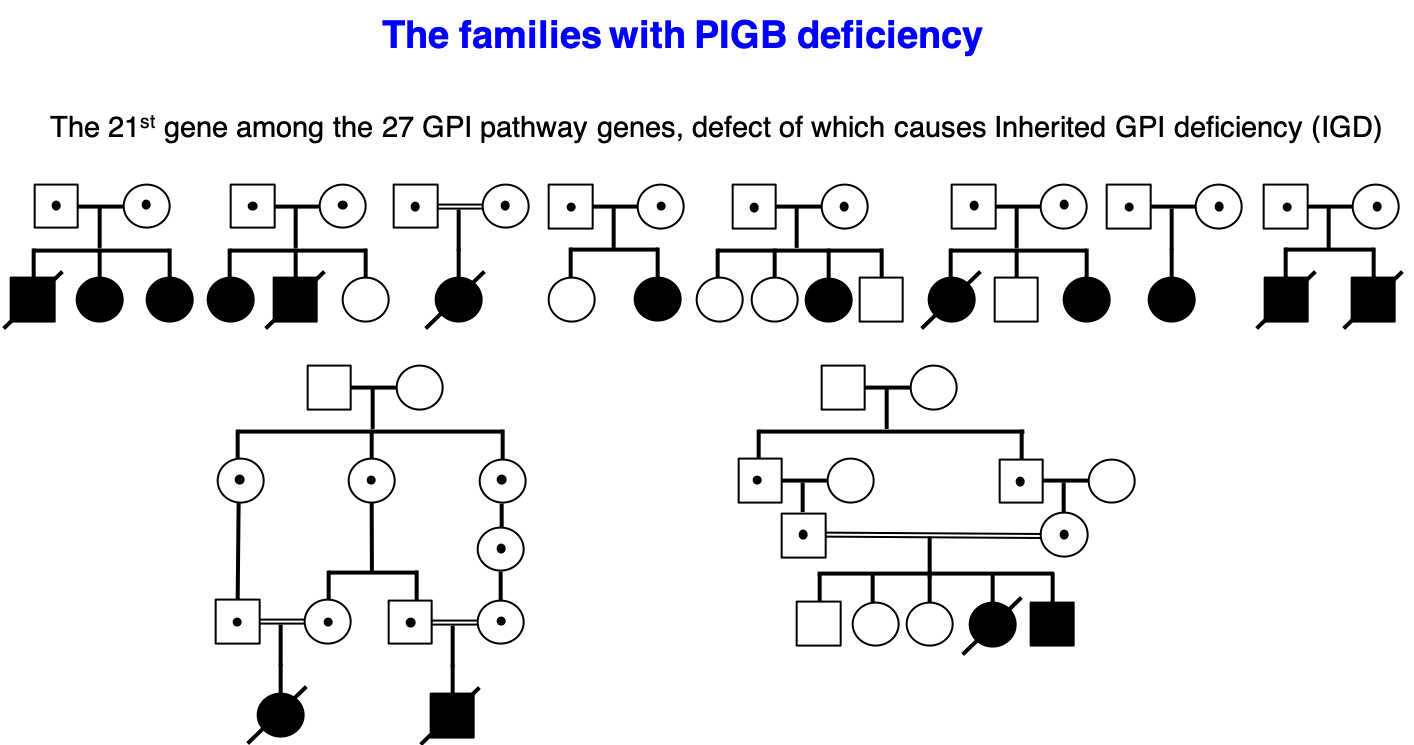Mutations in PIGB cause an inherited GPI biosynthesis defect (Kinoshita Lab, in AJHG)
Proteins anchored to the cell surface via glycosylphosphatidylinositol (GPI) play various key roles in the human body, particularly in development and neurogenesis. As such, many developmental disorders are caused by mutations in genes involved in the GPI biosynthesis and remodeling pathway. We describe ten unrelated families with bi-allelic mutations in PIGB, a gene that encodes phosphatidylinositol glycan class B that transfers the third mannose to the GPI. Ten different PIGB variants were found in these individuals. Flow cytometric analysis of blood cells and fibroblasts from the affected individuals showed decreased cell surface presence of GPI anchored proteins. Most of the affected individuals have global developmental and/or intellectual delay, all had seizures, two had polymicrogyria, and four had a peripheral neuropathy. Eight children passed away at a young age. Some of them had a clinical diagnosis of DOORS syndrome (Deafness, Onychodystrophy, Osteodystrophy, mental Retardation, Seizures), a condition with sensorineural deafness, shortened terminal phalanges with small finger nail and toenails, intellectual disability, and seizures, which overlaps with the severe phenotypes associated with inherited GPI deficiency. However, the main causative gene for DOORS syndrome is TBC1D24, which is involved in synaptic-vesicle trafficking. Most individuals tested showed elevated alkaline phosphatase, which is a characteristic of the inherited GPI deficiency, but not DOORS syndrome. It is notable that some severely affected individuals showed 2-oxoglutaric aciduria, which can be seen in DOORS syndrome, suggesting that severe cases of inherited GPI deficiency and DOORS syndrome might share some molecular pathway disruptions.
This article was published in American Journal of Human Genetics, on June 27, 2019.
Title: Mutations in PIGB cause an inherited GPI biosynthesis defect with an axonal neuropathy and metabolic abnormality in the severe cases.
Authors: Yoshiko Murakami, Thi Tuyet Mai Nguyen, Nissan Baratang, Praveen K Raju, Alexej Knaus, Sian Ellard, Gabriela Jones, Baiba Lace, Justine Rousseau, Norbert F Ajeawung, Atsushi Kamei, Gaku Minase, Manami Akasaka, Nami Araya, Eriko Koshimizu, Jenneke van den Ende, Florian Erger, Janine Altmüller, Zita Krumina, Jurgis Strautmanis, Inna Inashkina, Janis Stavusis, Areeg El-Gharbawy, Jessica Sebastian, Ratna Dua Puri, Samarth Kulshrestha, Ishwar C Verma, Esther M. Maier, Tobias B Haack, Anil Israni, Julia Baptista, Adam Gunning, Jill A Rosenfeld, Pengfei Liu, Marieke Joosten, María Eugenia Rocha, Mais O. Hashem, Hesham M Aldhalaan, Fowzan S Alkuraya, Satoko Miyatake, Naomichi Matsumoto, Peter Krawitz, Elsa Rossignol, Taroh Kinoshita, Philippe M Campeau
Links
- Home
- Achievement
- Research Activities
- Mutations in PIGB cause an inherited GPI biosynthesis defect (Kinoshita Lab, in AJHG)








